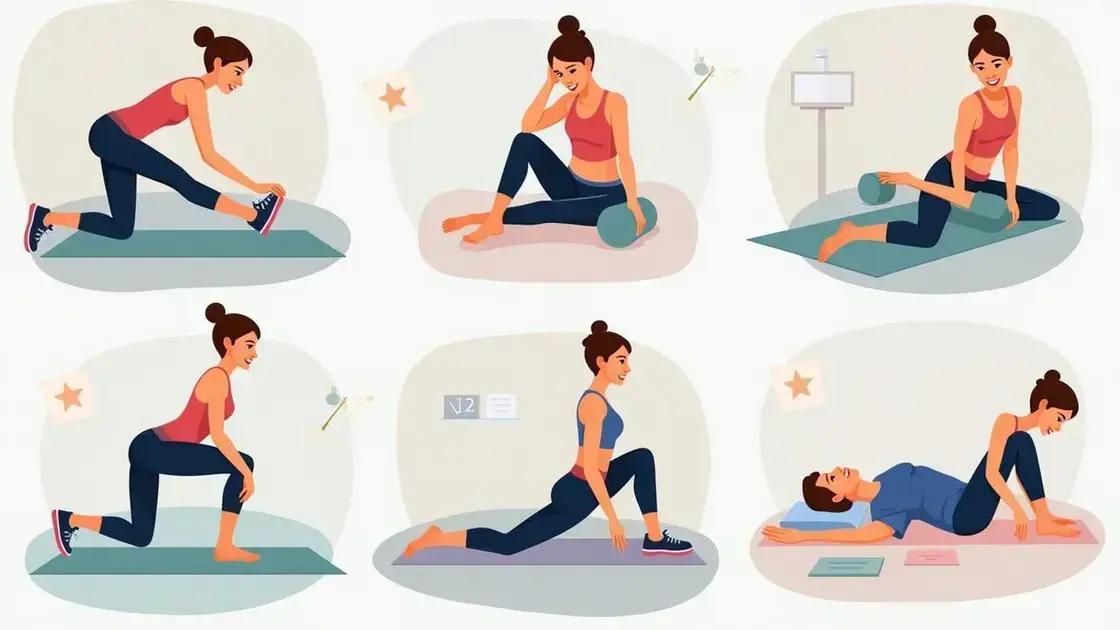To optimize recovery after high-intensity workouts, focus on understanding your recovery needs by prioritizing hydration, nutrition, and effective recovery techniques like active recovery, stretching, and foam rolling. Aim for adequate sleep and make sure to replenish lost fluids and electrolytes to enhance muscle recovery and performance.
After high-intensity workouts, understanding how to optimize recovery is essential for athletes and fitness enthusiasts alike. Recovery plays a critical role in enhancing performance and reducing fatigue. In this article, we’ll explore various strategies that can significantly aid in your recovery journey. By focusing on nutrition, hydration, and effective recovery techniques, you can ensure that your body is ready for the next challenge.
Understanding Recovery Needs

Understanding your recovery needs after high-intensity workouts is crucial for optimal performance. Recovery isn’t just about rest; it involves various elements that contribute to your overall wellbeing and enhance your fitness journey.
Physical Recovery
Your body undergoes significant stress during high-intensity workouts, and it’s essential to allow it to recover properly. This includes addressing muscle soreness and fatigue. Engaging in active recovery, like light jogging or stretching, can help reduce soreness and improve blood circulation.
Emotional Recovery
Besides physical aspects, emotional recovery is just as important. Intense workouts can be mentally taxing. Taking time for relaxation and mental decompression, such as through meditation or simply enjoying a hobby, can help restore your focus and motivation.
Sleep and Its Importance
Sleep is a critical component of recovery. Aim for 7-9 hours of quality sleep each night. During sleep, your body repairs tissues and synthesizes proteins, which are vital for recovery. Poor sleep can lead to decreased performance and increased fatigue.
Listening to Your Body
Every individual is different, and so are their recovery needs. It’s essential to listen to your body. Pay attention to signs of overtraining, such as persistent soreness or fatigue, and adjust your recovery schedule accordingly. Proper assessment of your individual needs will lead to better overall recovery.
Nutrition’s Role in Recovery

Nutrition plays a vital role in recovery after high-intensity workouts. What you eat can directly impact how well your body heals and replenishes energy. It is essential to focus on the right nutrients to support your recovery process.
Macronutrients Matter
Your body requires three main types of macronutrients: carbohydrates, proteins, and fats. Each serves a specific purpose in recovery. Carbohydrates help to replenish glycogen stores, which are essential for energy. Protein aids in repairing and building muscle tissue, while healthy fats support overall cellular health.
Post-Workout Nutrition Timing
Consuming the right nutrients post-workout is crucial. Aim to eat a meal or snack within 30 to 60 minutes after exercising. This helps maximize nutrient absorption. A balanced meal, including carbs and protein, can greatly enhance your recovery.
Hydration and Electrolytes
Don’t forget about hydration. Drinking water is vital, but consider replacing lost electrolytes, especially after intense workouts. Foods rich in potassium, sodium, and magnesium, like bananas or sports drinks, can help restore your body’s balance.
Whole Foods vs. Processed Foods
Prioritize whole foods over processed options when it comes to your recovery diet. Foods like fruits, vegetables, whole grains, and lean proteins provide the essential nutrients your body needs. Avoid excessive sugars and unhealthy fats, as they can hinder the recovery process.
Effective Recovery Techniques

There are several effective recovery techniques to incorporate into your post-workout routine. These methods help reduce soreness and restore energy levels. Try different techniques to find what works best for you.
Active Recovery
Active recovery involves engaging in low-intensity exercises, like walking or cycling, after a high-intensity workout. This keeps blood flowing to your muscles, helping to accelerate recovery and decrease soreness.
Foam Rolling
Foam rolling is a popular technique for muscle recovery. It acts like a self-massage, helping to release muscle tightness and improve blood circulation. Spend 1-2 minutes rolling each muscle group for effective results.
Stretching
Including static and dynamic stretching after workouts is essential. Static stretching helps lengthen muscles, while dynamic stretching prepares them for activity. Aim for 10-15 minutes of stretching to enhance flexibility and prevent stiffness.
Cold Therapy
Cold therapy, like ice baths or cold packs, can reduce inflammation and numb pain. Using this technique right after intense workouts may help you recover faster by minimizing muscle damage.
Mind-Body Practices
Consider incorporating mind-body practices like yoga or meditation into your recovery routine. These techniques not only help improve flexibility and balance but also reduce stress and promote relaxation, aiding the recovery process.
Importance of Hydration After Workouts

Staying hydrated is one of the most important aspects of recovery after workouts. When you exercise, your body loses fluids through sweat, which can lead to dehydration. Proper hydration after workouts helps to replenish these lost fluids and supports overall recovery.
Benefits of Hydration
Good hydration aids in muscle recovery. Water helps transport nutrients to cells and removes waste products. This process is essential for repairing muscle tissue after intense exercise.
How Much Water Do You Need?
A general guideline is to drink at least 16-24 ounces of water within 30 minutes after exercise. However, individual needs can vary based on workout intensity and duration. Monitor your body’s cues, and drink accordingly.
Signs of Dehydration
Pay attention to signs of dehydration, such as dark urine, fatigue, or dizziness. If you notice these symptoms, increase your fluid intake. Staying hydrated can improve your performance in future workouts.
Electrolytes Matter
Along with water, electrolytes like sodium and potassium should be replenished, especially after intense exercise. Consuming sports drinks or foods rich in these minerals can help restore balance in your body.
Water-Rich Foods
Incorporating water-rich foods like fruits and vegetables can also help with hydration. Think of watermelon, cucumbers, or oranges, which not only hydrate but provide essential nutrients that aid recovery.
In Summary: Optimizing Recovery After High-Intensity Workouts
Recovering effectively after high-intensity workouts is crucial for maintaining performance and preventing injury. Understanding your recovery needs, focusing on nutrition, and employing effective recovery techniques can significantly enhance your recovery process.
Moreover, staying properly hydrated plays an essential role in replenishing lost fluids and aiding muscle recovery. By incorporating these strategies into your routine, you can ensure that your body is well-equipped for future challenges.
Prioritize recovery to unlock your full potential and achieve your fitness goals more effectively.
FAQ – Frequently Asked Questions About Recovery After High-Intensity Workouts
Why is recovery important after high-intensity workouts?
Recovery is essential to allow your body to heal, replenish energy stores, and reduce the risk of injury, which can enhance overall performance.
What are the best nutrition practices for post-workout recovery?
Focus on consuming a balance of carbohydrates and proteins within 30-60 minutes after working out to optimize your recovery.
How much water should I drink after exercising?
It is recommended to drink at least 16-24 ounces of water within 30 minutes after intense exercise, depending on your body’s needs.
What are some effective recovery techniques?
Techniques like active recovery, foam rolling, stretching, and cold therapy can significantly aid in the recovery process.
How can I tell if I’m dehydrated?
Signs of dehydration include dark urine, fatigue, dizziness, and excessive thirst. If you notice these symptoms, increase your fluid intake.
Do electrolytes matter for recovery?
Yes, replenishing electrolytes is important, especially after intense workouts. Consuming sports drinks or foods rich in electrolytes can help restore balance.













